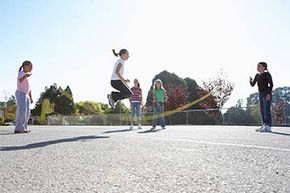Who Creates Folklore?
Since folklore comes from people -- from us -- it can be found everywhere. And since people can be divided into countless types of groups (sex, religion, age, ethnicity, nationality or income), you're likely part of many different groups that create folklore. Three of the most basic are children, families and communities [sources: Jaffe, Thompson]:
- Children: Perhaps surprisingly, children play an important role in passing on folklore. Games such as hopscotch, hide-and-seek and steal the bacon are all forms of folklore carried over from century to century by kids. So is the jump-rope chant, "Blue bells, cockle shells, eevey, ivy, over," and the various methods kids use to decide who is "it," such as counting off to "Bubble gum, bubble gum, in a dish, how many pieces do you wish?" Children also pass on riddles, dance songs, singing games and sayings, almost all orally or by imitation.
- Families: The family is a rich source of folklore. All of your family traditions form your own personal lore: How you celebrate the holidays, the games you play on birthdays, the foods you cook, the lullabies you sing to babies. So are the stories of your ancestors: How your family immigrated to the U.S. or other countries; what different family members did and said; who fought in a war or other conflict. Family folklore also includes material possessions such as an old steamer trunk, Christmas ornaments and grandma's kolacky recipe. In some cultures, namely Native American and West African, one community member was responsible for orally passing on to each family, through story or song, the history of their ancestors.
- Communities: Whether urban or rural, rich or poor, communities are also a wellspring of folklore. How does your town celebrate the holidays? Are there street decorations, parades, special foods or store events? What about important local foods or industries? Sheboygan, a heavily German city in Wisconsin, holds an annual Bratwurst Day festival to celebrate a favorite food, while New Orleans hosts a jazz festival to honor its musical roots. And then there are local customs. People in Iceland, home to innumerable natural hot springs, meet friends and neighbors in their country's ubiquitous thermal baths to catch up on local news and gossip. In Pennsylvania, deer-hunting is a popular activity. These are all forms of community folklore.
Advertisement
